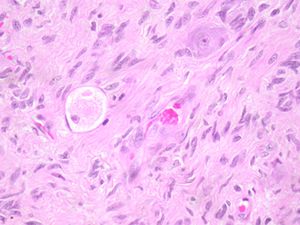Difference between revisions of "Key-Gaskell Syndrome"
Jump to navigation
Jump to search
| Line 26: | Line 26: | ||
*Possibly toxic cause. | *Possibly toxic cause. | ||
*Possibly in dry food or in vaccine? | *Possibly in dry food or in vaccine? | ||
| − | *Agent not really known, but produces general damage to autonomic nervous system.[[Category:Cat]] | + | *Agent not really known, but produces general damage to autonomic nervous system. |
| + | |||
| + | |||
| + | =====Feline dysautonomia, or Key-Gaskell Syndrome===== | ||
| + | [[Image:Ba 250 07.jpg|thumb|right|Histological section of degenerate neuron in feline dysautonomia(Courtesy of Susan Rhind)]] | ||
| + | * Occurs mostly in the UK and continental Europe. | ||
| + | * Is also of unknown aetiology. Suggested causative factors include: | ||
| + | ** Environmental toxins | ||
| + | ** Infectious agents | ||
| + | ** Botulinum toxins . | ||
| + | * Clinical signs: | ||
| + | ** Anorexia | ||
| + | ** Depression | ||
| + | ** Bradycardia | ||
| + | ** Decreased lacrimation, | ||
| + | ** Altered pupillary dilataion, | ||
| + | ** [[Megaoesophagus]] | ||
| + | ** Constipation. | ||
| + | * Degenerative lesions of autonomic nerve ganglia can be seen. | ||
| + | * Also occurs in the [[Key-Gaskell Syndrome|oesophagus]]. | ||
| + | [[Category:Cat]] | ||
| + | [[Category:Intestine_-_Functional_Obstruction]] | ||
Revision as of 12:58, 31 May 2010
- Autonomic polyganglioneuropathy in cats
- Abnormal function of the sympathetic and parasympathetic system.
- Whole autonomic system involved – affected animals usually die.
- Similar to grass sickness in horses.
Clinical
- Cats show:
- Megaoesophagus
- Dilated pupils
- Whole gut is involved (very little peristalsis)
- Constipation.
- Generalised autonomic effects:
- Reduced salivation
- Reduced lachrymation
- Bradycardia
- Constipation
- Pupillary dilatation
Pathology
- Histologically there is marked reduction in the number of neurones in all autonomic ganglia in the ventral horn of all levels of spinal cord accompanied by proliferation of non-neuronal cells.
- Similar changes in brain stem nuclei of cranial nerves.
Pathogenesis
- Acquired disease - outbreaks occurred in the past, now only occasionally seen but seems to be getting more common again.
- Possibly toxic cause.
- Possibly in dry food or in vaccine?
- Agent not really known, but produces general damage to autonomic nervous system.
Feline dysautonomia, or Key-Gaskell Syndrome
- Occurs mostly in the UK and continental Europe.
- Is also of unknown aetiology. Suggested causative factors include:
- Environmental toxins
- Infectious agents
- Botulinum toxins .
- Clinical signs:
- Anorexia
- Depression
- Bradycardia
- Decreased lacrimation,
- Altered pupillary dilataion,
- Megaoesophagus
- Constipation.
- Degenerative lesions of autonomic nerve ganglia can be seen.
- Also occurs in the oesophagus.
